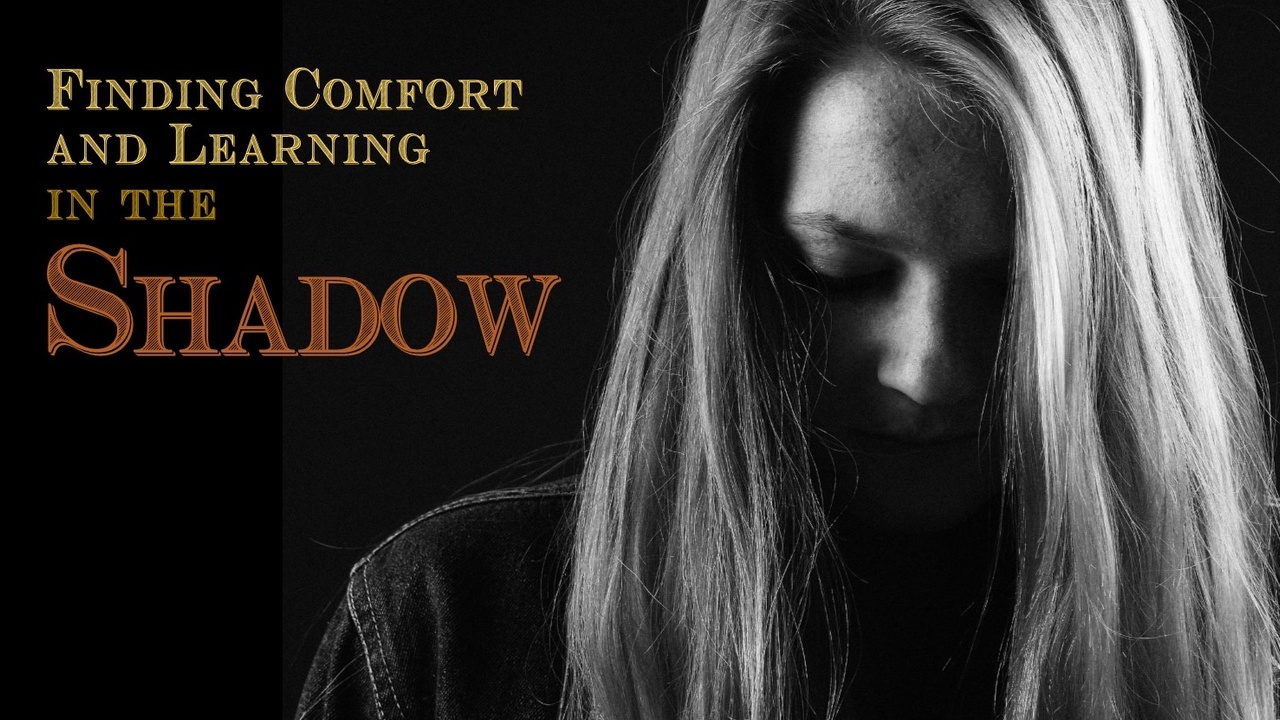Finding Comfort and Learning in the Shadow
Oct 20, 2022
Whether we’re going through a divorce, or just living life, we all experience a range of emotions – some of which are welcome, comfy, and enjoyable. Others show up like the flu – quickly, without warning and unbidden. Anger, jealousy, doubt, worry, judgment, victim-identification., indifference, comparison sarcasm, moodiness, and a whole host of others comprise this shadow.
Our shadow selves are the parts of us we don’t particularly care for and don’t want to see. Sometimes we simply justify these parts of ourselves without further inquiry. (“I had every right to be mad!”) Other times, we try to either dismiss or disclaim them. When we dismiss them, we sweep these aspects under the rug, usually with the help of a broom called shame. “I don’t get angry anymore.” “I shouldn’t judge, because I’m a _____________ (Christian, Buddhist, meditator, etc.).”
When we disclaim our shadows, we use projection (unconsciously pinning what’s going on inside us onto someone else). It’s a proxy, a stand-in, for ourselves with respect to our feelings. In other words, it’s the use of blame to deal with the parts of us that cause us discomfort. It seems like a quick fix, but it offers little in the way of learning. Our discomfort with our spouse working late with a female coworker turns into “my husband’s jealous if I come home late.” “My sister can be such a sarcastic witch,” may be our rebuttal to a sibling’s offhanded comment, but it really covers up the demeaning thoughts we’ve had as of late about our sister.
Rather than dismiss or disclaim these shadowy aspects, I believe they need to be embraced. It took me a long time to wrap my head around this, because at first, I really couldn’t see the good in them. I thought them to be disruptive interlopers in my life and the lives of my divorce clients. I just thought, “feel them, and let them go. And the sooner, the better.” I now know that these parts of us are very useful and instructive, if we can develop some curiosity about them.
Any time I feel or think something negative about a person, place, circumstance or event, I know that it’s time for me to excavate my own interior landscape and keep my mouth shut. I don’t need to spew my shadow; I need to look at it and understand what it’s trying to tell me. And when I do, here’s what I often find is going on inside:
- ANGER: I wrote a whole blog on this recently, called The Surprising Purpose of Anger. The purpose of anger is very important. According to the late Dr. Marshall Rosenberg, founder of the Nonviolent Communication process, anger lets us know when our needs and interests are not being met. Recognizing the anger, and understanding what’s driving it, allows us to make different choices that will meet our needs and interests.
- JUDGMENT: What parts of ourselves do we struggle to accept? Are there parts of us we’d like to change? How can we be more comfortable with, and loving towards, the aspects of ourselves we find unpalatable?
- VICTIM-IDENTIFICATION (Blame): Who is responsible for our lives? In what areas of our lives do we not want to be responsible for our experiences? What are we avoiding when we blame someone else or make another person, place, or circumstance responsible for our happiness? What would happen if we took complete responsibility for every part of our lives?
- DOUBT: Who would we be if we were successful and fulfilled? Why not us? What are we truly afraid of? Marianne Williamson, the author of A Return to Love, says it’s our Light and our limitless potential that really terrify us.
- JEALOUSY: What would we really like to accomplish, but haven’t? In what ways are we sabotaging our fidelity to ourselves and to our dreams? In what ways are we sabotaging our intimate relationships?
- SARCASM: What parts of ourselves do we feel so self-conscious about, that we would experience hurt and embarrassment if someone were to laugh at them? In what ways are we belittling ourselves?
- WORRY: What if everything worked out perfectly? What actions can we take in this moment to help foster a better outcome? How deeply can we trust life
UNTANGLE, UNPACK, & LIVE WISELY:
What do you do when your shadow surfaces? Justify it? Dismiss it? Disclaim it? Can you be curious about your shadow? What is it trying to tell you about you? What important information does it have to convey, which you won’t access if you justify, dismiss or disclaim it?
Suzanne E. Grandchamp

